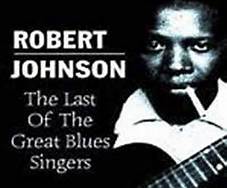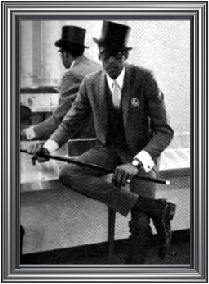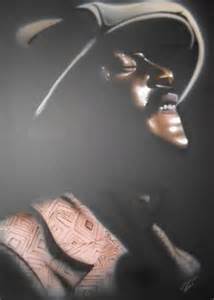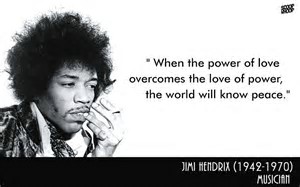It is a great joy to share the glorious past of the ghost of the greats whose shoulders. The history of black music is littered with tragic figures, and none are more tragic than Robert Johnson’s story that will live for eternity. Legend has it that he sold his soul to the devil at the crossroads for his story to live for all times.
Robert Leroy Johnson is among the most famous of all the Delta Blues musicians whose landmark recordings from 1936-37 display a remarkable combination of singing, guitar skills, and tremendous songwriting talent that have influenced generations of musicians. This amazing, ultimate star-crossed musical genius laid the early framework of rock and roll decades before that term was even imagined.
Not much is known about Johnson’s shadowy, poorly documented life and violent death at age 27, which is one of the reasons that have given rise to his legend. With that being true, the music and legacy he left behind is irrefutable and unparalleled.
He is considered by some to be the “Grandfather of Rock-and-Roll” for his vocal phrasing, original songs, and guitar style. His music has influenced a range of musicians, including Led Zeppelin, Bob Dylan, Jimi Hendrix, The Allman Brothers Band, The Rolling Stones, The White Stripes, The Black Keys, Peter Gabriel, Neil Young, and Warren Zevon. Eric Clapton called Johnson “the most important blues musician who ever lived.
Johnson was conceived in an extramarital affair and born in Hazelhurst, Miss. in 1911. Most of his biographical details have been lost to history, but what’s known is that he learned guitar in his teens, got married, and had a girl who died in childbirth. The death led Johnson to throw himself even deeper into his music. He fled to Robinsonville, Miss. where he was influenced by early blues legends Son House and Willie Brown.
By 1933, Johnson remarried and began playing the guitar professionally. He once related the tale of selling his soul to the devil at a crossroads in exchange for his talent. Johnson tells the story in his song “Crossroads Blues.” Playing for tips up and down the Delta, Johnson gained in popularity. But as he grew in fame and was known as a noted philanderer. He would also walk off in the middle of performances and not be seen or heard from for weeks at a time.
In 1936, he was put in contact with Columbia Records talent scout Ernie Oertle, who took him to San Antonio, Tex. where Johnson recorded classics including “Sweet Home Chicago,” “There’s A Hell Hound On My Trail,” and his signature “Terraplane Blues.”
Johnson began to tour nationally and became known for his unique voice and halting guitar riffs. But in 1938, as the legend goes, the devil caught up with him. While playing at a juke joint, he flirted with a woman whose husband became jealous. The man laced Johnson’s whiskey with strychnine that caused him to become violently ill playing until he collapsed. He died four days later at age 27, although conflicting stories say he survived the poisoning and died later of pneumonia.
There are at least two Mississippi gravesites that bear his name leaving questions about his passing and burial. “The reason, that it’s so powerful a story, is because it is the outline of the tragic side of the music that followed,” said music journalist Alan Light. “Some knew him as a musician, others by legend, but his shadow touches everyone who came out of that time and place.”
Black History is American History and I believe our story is the greatest story ever told. And that’s my Thought Provoking Perspective…
FaceBook @ John T. Wills
Twitter @ John T. Wills








 I am one who believes anyone can be taught how to do anything, but few are naturally given the rare gift of a unique and special talent like the great Donny Hathaway. This great musician man was one of a kind, in fact, Donny Edward Hathaway was the best natural jazz, blues, soul, R&B, and gospel vocalist and musician the world has known. Also, his collaborations with Roberta Flack are legendary as the scored high on the charts. The huge hit “where is the Love” won him a Grammy Award.
I am one who believes anyone can be taught how to do anything, but few are naturally given the rare gift of a unique and special talent like the great Donny Hathaway. This great musician man was one of a kind, in fact, Donny Edward Hathaway was the best natural jazz, blues, soul, R&B, and gospel vocalist and musician the world has known. Also, his collaborations with Roberta Flack are legendary as the scored high on the charts. The huge hit “where is the Love” won him a Grammy Award.

 I woke up this morning to the sweet sounds of soul blasting from my radio that inspired and lifted my spirits immensely. Having been awakened to a new day in such a profound way. I decided to offer my remembrance to the amazing crooners, songstress’, prolific singer-songwriters and record producers who’ve transitioned to that wonderful place all of us wish to go. Their amazing talent must make-up the most amazing heavenly choir.
I woke up this morning to the sweet sounds of soul blasting from my radio that inspired and lifted my spirits immensely. Having been awakened to a new day in such a profound way. I decided to offer my remembrance to the amazing crooners, songstress’, prolific singer-songwriters and record producers who’ve transitioned to that wonderful place all of us wish to go. Their amazing talent must make-up the most amazing heavenly choir. Singer/Songwriter/Guitarist/Legend Charles Edward Anderson “Chuck” Berry born October 18, 1926, in St. Louis, Missouri transitioned this life at his home in St. Louis to be with the ancestors on March 18, 2017. They told us this person or that person created Rock & Roll, namely folks like Elvis, but we know like everything in America was stolen from black people. So it is well-known that the great Mr. Berry was the creator and the beginning of what is called Rock & Roll. That’s it and that’s all! Thank you sir for all that you gave the world – R.I.P. And that’s my thought provoking perspective…
Singer/Songwriter/Guitarist/Legend Charles Edward Anderson “Chuck” Berry born October 18, 1926, in St. Louis, Missouri transitioned this life at his home in St. Louis to be with the ancestors on March 18, 2017. They told us this person or that person created Rock & Roll, namely folks like Elvis, but we know like everything in America was stolen from black people. So it is well-known that the great Mr. Berry was the creator and the beginning of what is called Rock & Roll. That’s it and that’s all! Thank you sir for all that you gave the world – R.I.P. And that’s my thought provoking perspective…





Remembering Our Greatest Scholar: John Henry Clarke
His mother was a washerwoman who did laundry for $3 a week and his father was a sharecropper. As a youngster Clark caddied for Dwight Eisenhower and Omar Bradley “long before they became Generals or President,” Clarke would later recount in describing his upbringing in rural Alabama.
Ms. Harris his third grade teacher convinced him that one day I would be a writer but before he became a writer he became a voracious reader inspired by Richard Wright’s Black Boy.a vertern who enlisted in the army and earned the rank of Master Sergeant. After mustering out, Clarke moved to Harlem and committed himself to a lifelong pursuit of factual knowledge about the history of his people and creative application of that knowledge. Over the years, Clarke became both a major historian and a man of letters.
His literary accomplishments were very significant but he was best known as a historian. He wrote over two hundred short stories with “The Boy Who Painted Christ Black” is his best known. Clarke edited numerous literary and historical anthologies including American Negro Short Stories (1966), an anthology which included nineteenth century writing from writers such as Paul Laurence Dunbar and Charles Waddell Chestnut, and continued up through the early sixties with writers such as LeRoi Jones (Amiri Baraka) and William Melvin Kelley. This is one of the classic collections of Black fiction.
Reflective of his commitment to his adopted home, Clarke also edited Harlem, A Community in Transition and Harlem, U.S.A. Never one to shy away from the difficult or the controversial, Clarke edited anthologies on Malcolm X and a major collection of essays decrying William Styron’s “portrait” of Nat Turner as a conflicted individual who had a love/hate platonic and sexually-fantasized relationship with Whites. In both cases, Clarke’s work was in defense of the dignity and pride of his beloved Black community rather than an attack on Whites.
What is significant is that Clarke did the necessary and tedious organizing work to bring these volumes into existence and thereby offer an alternative outlook from the dominant mainstream views on Malcolm X and Nat Turner, both of whom were often characterized as militant hate mongers. Clarke understood the necessity for us to affirm our belief in and respect for radical leaders such as Malcolm X and Nat Turner. It is interesting to note that Clarke’s work was never simply focused on investigating history as the past, he also was proactively involved with history in the making.
As a historian Clarke also edited a book on Marcus Garvey and edited Africa, Lost and Found (with Richard Moore and Keith Baird) and African People at the Crossroads, two seminal historical works widely used in History and African American Studies disciplines on college and university campuses. Through the United Nations he published monographs on Paul Robeson and W.E.B. DuBois. As an activist-historian he produced the monograph Christopher Columbus and the African Holocaust. His most recently published book was Who Betrayed the African Revolution?
In the form of edited books, monographs, major essays and book introductions, John Henrik Clarke produced well over forty major historical and literary documents. Rarely, if ever, has one man delivered so much quality and inspiring literature. Moreover, John Henrik Clarke was also an inquisitive student who became a master teacher.
During his early years in Harlem, Clarke made the most of the rare opportunities to be mentored by many of the great 20th century Black historians and bibliophile. Clarke studied under and learned from men such as Arthur Schomburg, William Leo Hansberry, John G. Jackson, Paul Robeson, Willis Huggins and Charles Seiffert, all of whom, sometimes quietly behind the scenes and other times publicly in the national and international spotlight, were significant movers and shakers, theoreticians and shapers of Black intellectual and social life in the 20th century.
From the sixties on, John Henrik Clarke stepped up and delivered the full weight of his own intellectual brilliance and social commitment to the ongoing struggle for Black liberation and development. Clarke became a stalwart member and hard worker in (and sometimes co-founder of) organizations such as The Harlem Writers Guild, Presence Africaine, African Heritage Studies Association, the Association for the Study of Negro Life and History, the National Council of Black Studies and the Association for the Study of Classical African Civilizations.
Formally, Clarke lectured and held professorships at universities worldwide. His longer and most influential tenures were at the Africana Studies and Research Center at Cornell in Ithaca, New York, and in African and Puerto Rican Studies at Hunter College in New York City. He received honorary degrees from numerous institutions and served as consultant and advisor to African and Caribbean heads of state. In 1997 he was the subject of a major documentary directed by the noted filmmaker Saint Claire Bourne and underwritten by the Hollywood star Westley Snipes.
John Henrik Clarke is in many ways exemplary of the American ethos of the self-made man. Indicative of this characteristic is the fact that Clarke changed his given name of John Henry Clark to reflect his aspirations. In an obituary he penned for himself shortly before his death, John Henrik Clarke noted “little black Alabama boys were not fully licensed to imagine themselves as conduits of social and political change. …they called me ‘bubba’ and because I had the mind to do so, I decided to add the ‘e’ to the family name ‘Clark’ and change the spelling of ‘Henry’ to ‘Henrik,’ after the Scandinavian rebel playwright, Henrik Ibsen.
I like his spunk and the social issues he addressed in ‘A Doll’s House.’ …My daddy wanted me to be a farmer; feel the smoothness of Alabama clay and become one of the first blacks in my town to own land. But, I was worried about my history being caked with that southern clay and I subscribed to a different kind of teaching and learning in my bones and in my spirit.”
Body and soul, John Henrik Clarke was a true champion of Black People. He bequeathed us a magnificent legacy of accomplishment and inspiration borne out of the earnest commitment of one irrepressible young man to make a difference in the daily and historical lives of his people.
Viva, John Henrik Clarke!
Resource: Black College Online
Share this:
1 Comment | tags: African American, black history, commentary, educatio, history, John Henry Clarke, news, scholar, truth, Uncategorized | posted in African American, black issues, blues, civil rights, education, GOP, history, Obama, Politics, racism